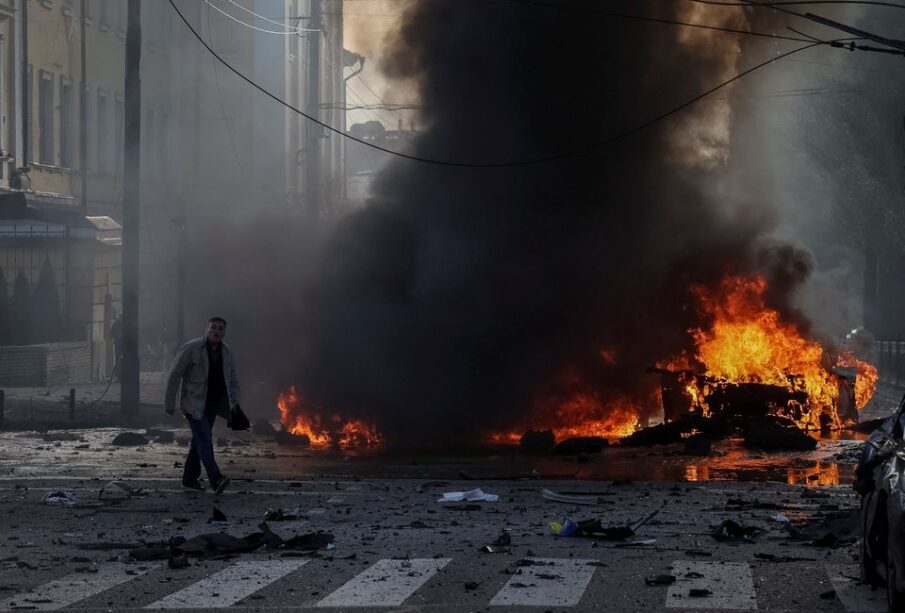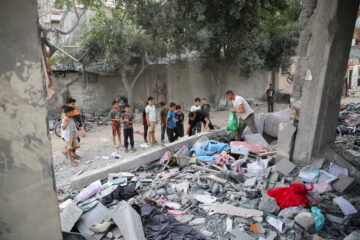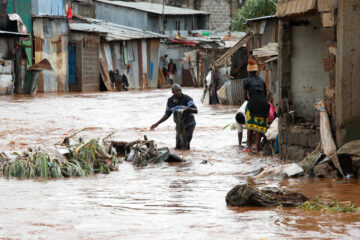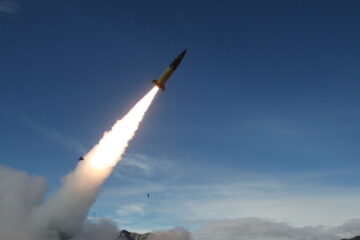Russia vows to respond to greater Western involvement in Ukraine
 A driver walks near his burned car after Russian military strike, as Russia's invasion of Ukraine continues, in central Kyiv, Ukraine October 10, 2022. REUTERS/Gleb Garanich
A driver walks near his burned car after Russian military strike, as Russia's invasion of Ukraine continues, in central Kyiv, Ukraine October 10, 2022. REUTERS/Gleb GaranichU.S. President Joe Biden promised to provide advanced air defence systems, and the Pentagon said on Sept. 27 it would start delivering the National Advanced Surface-to-Air Missile System over the next two months or so.
Biden and Group of Seven leaders will hold a virtual meeting on Tuesday to discuss their commitment to support Ukraine, the White House said.
“We warn and hope that they realise the danger of uncontrolled escalation in Washington and other Western capitals,” Russian Deputy Foreign Minister Sergei Ryabkov was quoted as saying by RIA news agency on Tuesday.
Russian missiles hit targets across Ukraine early on Monday, killing 19 people and wounding 105, emergency services officials said, as they tore into intersections, parks and tourist sites. As many as 301 settlements in the regions of Kyiv, Lviv, Sumy, Ternopil and Khmelnytsky remained without electricity on Tuesday morning.
The barrage of dozens of cruise missiles fired from air, land and sea was the most widespread wave of air strikes to hit away from the front lines, at least since the initial volleys on the war’s first day, Feb. 24.
Ukrainian officials reported more strikes on Tuesday including one on the southeastern town of Zaporizhzhia which killed at least one person.
Russian President Vladimir Putin said he ordered “massive” long-range strikes after accusing Ukraine of an attack on the bridge linking Russia to annexed Crimea on Saturday.
Ukrainian President Volodymyr Zelenskiy spoke to Biden on Monday and wrote on Telegram that air defence was the “number 1 priority in our defence cooperation”.
“We will do everything to strengthen our armed forces,” he said in a late Monday address. “We will make the battlefield more painful for the enemy.”
Russia’s ambassador to the United States, Anatoly Antonov, said more Western help to Ukraine raised the risk of a wider war.
“Such assistance, as well as providing Kiev with intelligence, instructors and combat guidelines, leads to further escalation and increased the risks of a clash between Russia and NATO,” Antonov told media.
Faced with blackouts, Ukraine halted electricity exports to neighboring Moldova and the European Union, at a time when the continent already faces surging power prices that have stoked inflation and hampered industrial activity.
Power outages caused by Russian missile attacks trapped 854 miners underground at mines in Krivyi Rih, but rescuers brought them out safely, Oleksandr Vilkul, the head of city’s military administration said.
BATTLEFIELD SETBACKS
Russia’s air strikes came three days after a blast damaged the bridge it built after seizing Crimea in 2014. Russia blamed Ukraine and called the deadly explosion “terrorism”.
“To leave such acts without a response is simply impossible,” said Putin, alleging other, unspecified attacks on Russian energy infrastructure. He threatened more strikes if Ukraine hits Russian territory.
Ukraine, which views the bridge as a military target sustaining Russia’s war effort, celebrated the blast without claiming responsibility.
After weeks of setbacks on the battlefield, Russian authorities are facing the first sustained domestic criticism of the war, with commentators on state television demanding ever tougher measures.
Putin responded to Ukrainian advances by ordering a mobilisation of hundreds of thousands of reservists, proclaiming the annexation of occupied territory and threatening to use nuclear weapons.
Russia says it is waging a “special military operation” in Ukraine to rid it of nationalists and protect Russian-speaking communities. Ukraine and the West say it is an unprovoked war of aggression.
Serhiy Gaidai, the Luhansk regional governor said on Telegram that Ukrainian troops repelled attacks around several towns in the east, including Bakhmut, which has been a key objective for Russian forces.
Reuters was unable to verify the battlefield reports.
Russia also suffered a diplomatic setback on Monday, as the UN General Assembly voted to reject its call for the 193-member body to hold a secret ballot this week on whether to condemn Moscow’s annexations of four partially occupied regions in Ukraine.
The president of the United Arab Emirates, a member of the group of oil producers known as OPEC+ that rebuffed the United States last week by announcing steep production cuts, will travel to Russia on Tuesday to meet Putin and push for “military de-escalation”, UAE state news agency WAM reported.
SOURCE: REUTERS








